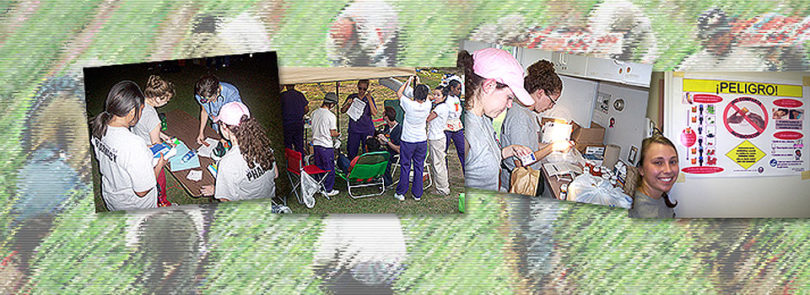The Farm Worker Family Health Program is a 15-year old community partnership designed to increase the delivery of healthcare services to migrant farm worker families, and now the UGA College of Pharmacy is contributing services.
Trina von Waldner, director of the UGA College of Pharmacy’s Office of Postgraduate Continuing Education, developed a two-week summer program for pharmacy students to work in clinics set up for approximately 1,000 migrant farm workers and their children at eight farm camps in the Colquitt County area.
“Since many of these people have no transportation and no insurance, they have no other access to health care without the clinics,” noted von Waldner, adding that most of the workers have work visas because farm owners need a reliable work force. “Most workers are not eligible for Medicaid, however. And many of them have paid thousands of dollars to move here, and they have little money left after paying for food and lodging and sending money home to their families.”
UGA’s six participating pharmacy students developed a two-pronged approach for providing pharmacy services this population including health education for the summer school children and patient care at the field clinics. The students developed educational materials in English and in Spanish on diet and nutrition, hygiene and medication safety, all specific healthcare issues that had been previously identified by the nurse practitioners who work with FWFHP.
Typically, each morning the pharmacy students worked at the school reviewing charts, escorting students and providing health education. They also inventoried medications and supplies and filled prescriptions at the base pharmacy. Afternoon activities included networking with other health professions students and reviewing cases. After the sun went down, they saw patients at a mobile clinic that was set up at a different farm each night.
“My experience working with this population changed my perception about pharmacy practice. I realized that no matter how basic the drug information or counseling patients was, these patients desperately needed our time and teaching to get the most benefit from their medications and to get back to their daily lives,” said pharmacy student Evelyn Cowan.
Von Waldner expects the six volunteers already signed up for the 2010 summer session to refine computer data entry and prescription filling, increase patient consultations and improve gathering of statistical data. She also plans to help the students develop a research project to determine the best treatment options for a particular healthcare need, such as skin problems, based on the workers’ lifestyle.
“Doing more to help the children is another priority, particularly by increasing their knowledge of good health practices through nutrition, diet, exercise, hygiene and safety in the home,” she added. “They are so respectful and appreciative that it makes the educational experience even more rewarding.”






